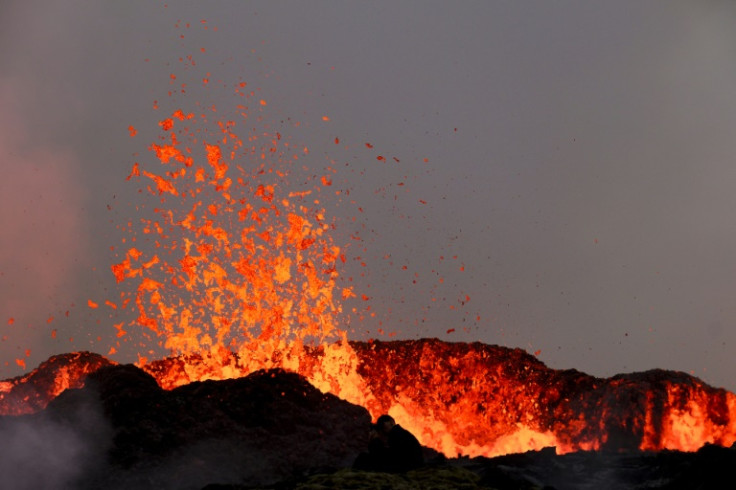Iceland asks tourists not to come because of volcano emitting deadly gas
This volcano in Iceland last erupted in 2022.

Iceland has warned tourists about the eruption of Fagradalsfjall volcano, which is spewing lava and noxious gases into the air.
Iceland's Meteorological Office has urged locals and foreigners to stay away from the fissure as the "gas pollution could be highly dangerous." Residents in nearby Reykjanes have been told to stay indoors and encouraged to sleep with their windows closed due to the risk of deadly toxic gas emerging from the volcano.
Volcano eruption in Iceland
The volcano eruption took place in an uninhabited valley near the Litli-Hrutur Mountain, southwest of the capital, Reykjavik, and some miles from Iceland's main airport. Following thousands of earthquakes in the area, the eruption began Monday afternoon, meteorological authorities said.
By Tuesday morning, the fissure and the volume of the eruption had reduced. The latest eruption has come 11 months after its last eruption officially ended.
The Fagradalsfjall volcano also erupted in 2021 and 2022 without causing damage or interruptions to flights despite being near Keflavik Airport, Iceland's international air traffic hub. Even after the latest eruption, the airport remained open on Tuesday.
Volacano's videos go viral
The Icelandic Meteorological Office said the latest eruption was initially more explosive than the previous two. Aerial videos showed streams of orange molten lava and clouds of gases spewing from a snaking fissure about 900 meters (half a mile) long.
Another stunning livestream from “Live from Iceland” 😍
— Volcaholic 🇰🇪 🇬🇧 🌋 (@volcaholic1) July 12, 2023
Link - https://t.co/TVEg2gePiS#Reykjanes #LitliHrutur #eruption #volcano #iceland #icelanderuption pic.twitter.com/6Hxz6IZEwI
‼️ BREAKING – The Fagradalsfjall volcano erupting near the capital of Reykjavik in Iceland for the third year in a row. pic.twitter.com/GR6jBpTdgV
— {Matt} $XRPatriot (@matttttt187) July 12, 2023
"Gas pollution is high around the eruption and dangerous. Travelers are advised not to enter the area until responders have had a chance to evaluate conditions," the Met Office said.
After the eruption weakened, University of Iceland geophysics professor Magnús Tumi Guðmundsson said it was "very good news." He said the eruption could "certainly last a long time, but luckily we're not looking at a continuation of what we saw in the first few hours."
When the Fagradalsfjall volcano erupted in 2021, it produced spectacular lava flows for several months.
Iceland, which sits above a volcanic hotspot in the North Atlantic, averages an eruption every four to five years.
The most destructive one in recent times took place in 2010 when the Eyjafjallajokull volcano erupted, sending huge clouds of ash into the atmosphere and leading to extensive airspace closures over Europe. More than 100,000 flights were grounded, stranding millions of international travellers and suspending air travel for days because of concerns the ash could damage jet engines.
UK Foreign Office's advisory
Meanwhile, the Foreign, Commonwealth and Development Office (FCDO) has advised people travelling to Iceland to regularly check for updates.
"Iceland is volcanically and seismically active and weather conditions can be severe and change rapidly," the FCDO wrote on their official website.
"Monitor the Icelandic Met Office website, the Safe Travel website, and the Icelandic Road and Coastal Administration website for the latest updates and follow the advice of the local authorities. In case of an emergency, the Department of Civil Protection and Emergency Management in Iceland will send out text messages to anyone located in the vicinity. For more information see Natural disasters," the UK Foreign Office added.
For emergency services, a traveller in Iceland must call 112, as per FCDO's advisory.
With peak summer travel ongoing, FCDO has been giving out advisories on several destinations that are popular among UK travellers.
Earlier, the FCDO warned its people about street crime in Spain and how to report it if they become a target of it while travelling in the country in the coming days. Spain, meanwhile, has removed all the remaining covid related rules as it is not mandatory anymore to wear a face mask in healthcare centres and pharmacies.
The UK Foreign Office has also alerted British travellers about possible terrorist threats in Turkey. Around 1.6 million tourists from the UK are expected to vacation in Turkey in the coming weeks.
© Copyright IBTimes 2025. All rights reserved.






















